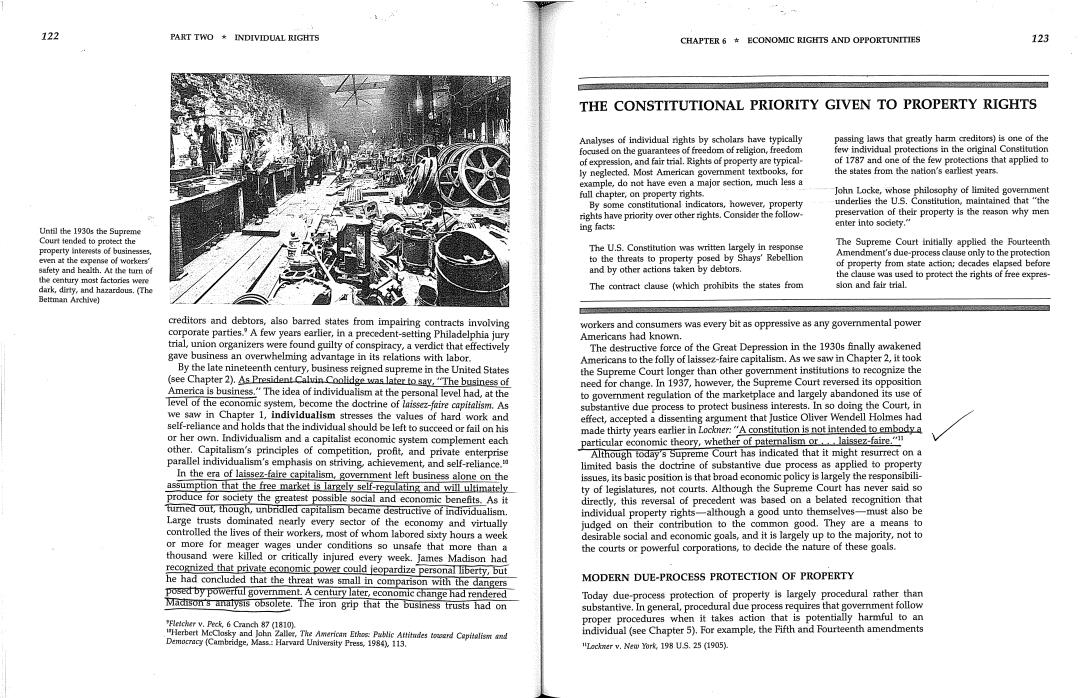正在加载图片...

122 PART TWO INDIVIDUAL RIGHTS CHAPTER 6*ECONOMIC RIGHTS AND OPPORTUNITIES 123 THE CONSTITUTIONAL PRIORITY GIVEN TO PROPERTY RIGHTS Analyses of individual rights by scholars have typically passing laws that greatly harm creditors)is one of the focused on the guarantees of freedom of religion,freedom few individual protections in the original Constitution of expression,and fair trial.Rights of property are typical. of 1787 and one of the few protections that applied to ly neglected.Most American government textbooks,for the states from the nation's earliest years. example,do not have even a major section,much less a full chapter,on property rights. John Locke,whose philosophy of limited government By some constitutional indicators,however,property underlies the U.S.Constitution,maintained that "the rights have priorityover other rights.Consider the foilw preservation of their property is the reason why men Until the 1930s the Supreme ing facts: enter into society." Court tended to protect the The U.S.Constitution was written largely in response The Supreme Court initially appled the Fourteenth to the threats to property posed by Shays'Rebellion Amendment's due-process clause only to the protection even at the expense of workers safety and health.At the turn of and by other actions taken by debtors. of propertyfromseacion:decades elapsed before the clause was used to protect the rights of free expres- the century most factories were dark,dirty and hazardous.(The The contract clause (which prohibits the states from sion and fair trial. Bettman Archive) creditors and debtors,also barred states from impairing contracts involving workers and consumers was every bit as oppressive as any governmental power corporate parties.A few years earlier,in a precedent-setting Philadelphia jury Americans had known. trial,union organizers were found guilty of conspiracy,a verdict that effectively The destructive force of the Great Depression in the 1930s finally awakened gave business an overwhelming advantage in its relations with labor. Americans to the folly of laissez-faire capitalism.As we saw in Chapter 2,it took By the late nineteenth century,business reigned supreme in the United States (see Chapter 2).As President Calvin Coolidge was later tosay "The business of the Supreme Court longer than other government institutions to recognize the need for change.In 1937,however,the Supreme Court reversed its opposition America is business."The idea of individualism at the personal level had,at the to government regulation of the marketplace and largely abandoned its use of Tevel of the economic system,become the doctrine of issez-fire cmpitalism.As substantive due process to protect business interests.In so doing the Court,in we saw in Chapter 1,individualism stresses the values of hard work and effect,accepted a dissenting argument that Justice Oliver Wendell Holmes had self-rellance and holds that the individual should be left to succeed or fail on his made thirty years earlier in Lockner:"A constitution is not intended to embody a or her own.Individualism and a capitalist economic system complement each other.Capitalism's principles of competition,profit,and private enterprise particular economic theory,whether of patemalism orlaissez-faire." Although today's Supreme Court has indicated that it might resurrect on a parallel individualism's emphasis on striving achievement,and self-reliance. limited basis the doctrine of substantive due process as applied to property In the era of laissez-faire capitalism,government left business alone on the issues,its basic position is that broad economic policy is largely the responsibili- assumption that the free market is largely self-regulating and will ultimately ty of legislatures,not courts.Although the Supreme Court has never said so produce for society the greatest possible social and economic benefits.As it directly,this reversal of precedent was based on a belated recognition that furned out,though,unbridled capitalism became destructive of individualism individual property rights-although a good unto themselves-must also be Large trusts dominated nearly every sector of the economy and virtually judged on their contribution to the common good.They are a means to controlled the lives of their workers,most of whom labored sixty hours a week desirable social and economic goals,and it is largely up to the majority,not to or more for meager wages under conditions so unsafe that more than a the courts or powerful corporations,to decide the nature of these goals. thousand were killed or critically injured every week.James Madison had recognized that private economic power could jeopardize personal iberty,but he had concluded that the threat was small in comparison with the dangers MODERN DUE-PROCESS PROTECTION OF PROPERTY posedt by powerful government.A century later,economic change had rendered Today due-process protection of property is largely procedural rather than Madison's analysis obsolete.The iron grip that the business trusts had on substantive.In general,procedural due process requires that government follow "Flelcher v.Peck,6 Cranch 87 (1810) proper procedures when it takes action that is potentially harmful to an individual (see Chapter 5).For example,the Fifth and Fourteenth amendments Democracy (Cambridge,Mass:Harvard Unlveraity Press,1984)113. Lockmer v.New York,198 U.S.25 (1905)